Dr. Terry Bryan
Sing a Song of Postcards!
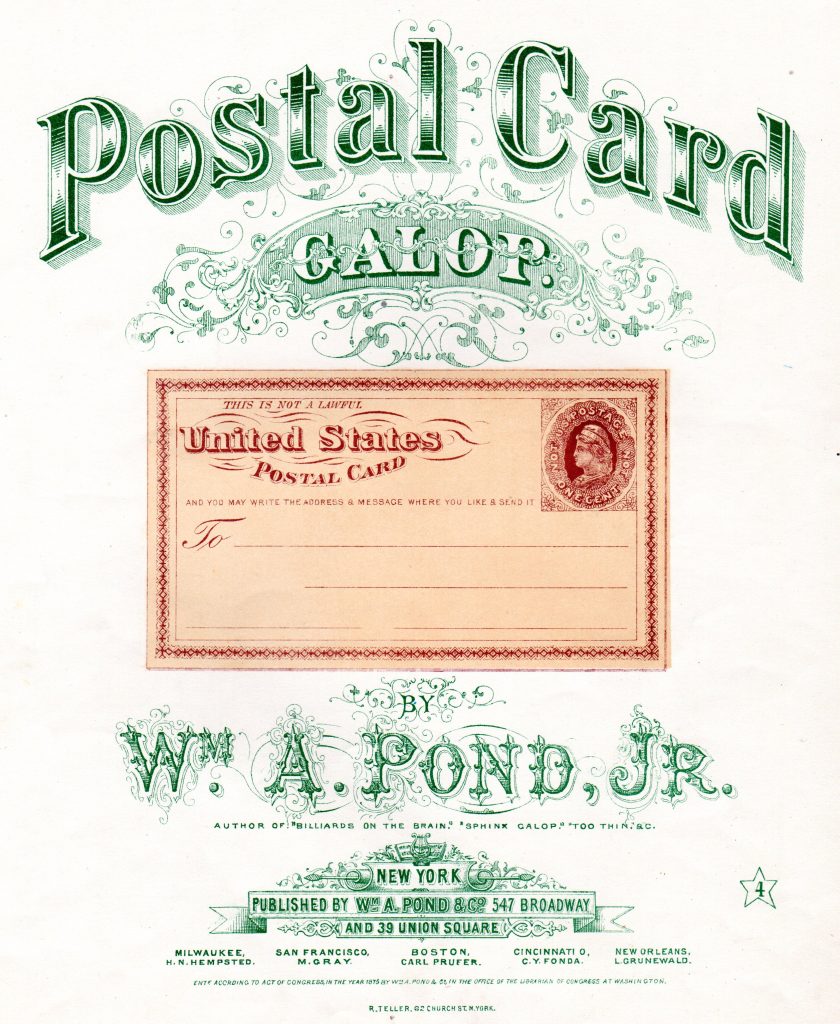
Postal Card Galop
Sheet music became commonplace in homes starting about 1840. The rise of the middle class, increased leisure time, and the Industrial Revolution were trends that led to a more educated population with enhanced music literacy.
Patrons of theaters and performances heard live music. The only way to hear the tunes afterwards was to buy the printed music and sing and play it at home.
Daughters of that new leisure class took piano lessons, pianos became cheaper to own, and singing in the parlor became a popular evening diversion.
Here’s a postcard of a lady who is splashing in the sea
It’s a good view of the water, but not very good of me,
Here’s a postcard of me riding on a burro of the trail,
No that isn’t my umbrella; it’s the burro’s busy tail.
AND
We’ve all of us decided that dame Nature’s simply grand,
We have sent a million postcards to the ones we’ve left behind,
For we want to have the knowledge that they’ll keep us all in mind,
AND
We want to send a postcard home, home, home,
Yes, we want to send a postcard home.
Here is one of my hotel.
That’s my window in the El.
When I get my bill I yell,
And I want to send a postcard home!
An estimated three million songs have been published as sheet music, piano score and lyrics. In the 19th century, sheets were expensively lithographed. Some were published in higher-priced editions with illustrated covers. Fifty or sixty cents for a single piece was prohibitive in many families. Music was loaned among friends. This accounts for the owner’s name often written on the covers.
Instrumental sheets were also common. Dance music, music descriptive of a mood, or show pieces sold well. Again, there was no preserving of a live performance, but you could learn to play and take the tune home on a page.
Some songs had a nationwide following. Stephen Foster was one of our first superstar composers. Charles K. Harris’ After the Ball sold upwards of two million copies in the 1890s; by now, his sales have exceeded five million pieces.
Sheet music sales waned in the 1970s. By percentage, music on paper gradually became a minor part of the music industry after World War II.
Player pianos, records, tapes, radio, TV and digital media have all contributed to a decline in music literacy; fewer children are taking piano lessons. There is not much market for a single song/piano score, and music stores do not give much space to the product.
Some sheet music is collected by topic. Particular composers, show tunes, stars’ pictures on the covers, decorative covers, sports, black history, and cover artists are popular topics. More specialized collections can be formed: songs about calendars, songs about ships, songs about localities and more. Decorative covers, especially pre-WWI cover pictures related to the song within, are highly collectible. Whatever the topic, somebody has written a song about it.
“Philatelic Music” is fairly plentiful. Lots of songs have been written about mail and letters (e.g. I’m Gonna Sit Right Down and Write Myself a Letter). Stamps, postmen and post offices also have songs, however, only a few numbers are related to postcards.
I Want to Send a Postcard Home
Wilbur Nesbit, Arthur Weld, 1907
from “The Girl Rangers” (show)
Postcard Song Sheets
Carte Postale Heinrich Strobl, no date (1870s?)
(Early Correspondenz Karte on cover)
(Hungarian with French publisher)
Correspondenzkarten Franz Zikoff, no date (1870s)
(Early card delivered by cherubs on cover)
(Breslau, Prussia publisher)
(Instrumental piano performance piece)
Having A good Time, Wish You Were Here Al Dubin-Sammy Fain, 1932
(Postcard on cover)
“This little card I am sending to you, dear…”
I Want To Send a Post Card Home Walter Nesbit, Arthur Weld, 1907
(Lyrics sampled above)
Les Jolies Cartes Postales Pierre Delanoe, Yves Belluardo, 1971.
(Instrumental Waltz)
My Postcard Girl Addison Burkhardt, Louis Hirsch, 1908.
(Color postcards on cover)
A guy is jilted from abroad “on the souvenir postcard plan.”
Please, Dear Santa Boots Elliott, 1950
(Divided back postcard on cover)
The Picture Post-Card Polka Ida Hampden, no date
(Easy piano instrumental, British)
Postal Card Galop William Pond, 1875
(Early U.S. postal card on cover)
Postcard From Paris Jimmy Webb, 1989
(Divided back of a Claude Monet postcard on cover)
Send Me Love, A Postal Card Louis Gottschalk, Edward Corliss, 1904.
(Lyrics sampled below)
Thanks For the Card You Sent Me Johnny Tucker, Jimmy Marchant, 1935.
(Divided back card from the composers on cover)
To Any Girl Lew Brown, Albert Von Tilzer, 1917
(Postcard on cover)
“I found a picture postal card while on the street today…”
Two Cents, Three Eggs and a Postcard Mickey Barner, Larry Vincent, 1949
(Postcard on cover)
(Jefferson 1 cent return card to the music publisher)
“The postcard I’d write to my sweetheart, if I had a sweetheart to write…”
Send Me, Love, A Postal Card
Louis Gottschalk, Edward Corliss, 1904
from “Cinderella and the Prince” (show)
Chorus:
Send me, love, a postal card,
A pretty card,
A picture card.
Then I’ll see that you still love me,
Send every day a card to me.
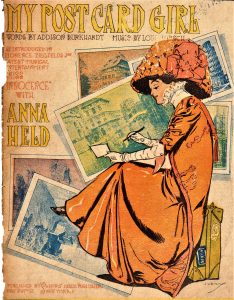
My Postcard Girl
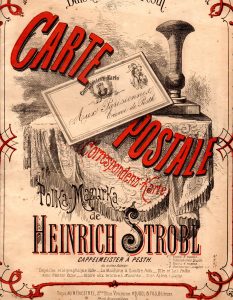
Carte Postale
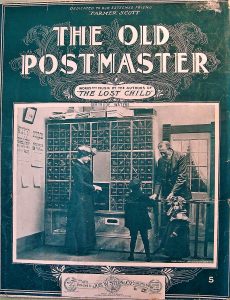
The Old Postmaster
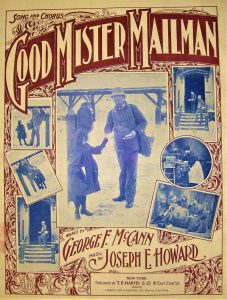
Good Mister Mailman
There are undoubtedly many more postcard songs. The Library of Congress database lists all U.S. songs copyrighted over the years. The database does not describe content or cover pictures, so if “postcard” is not in the title, there is not much basis for a search. Please reply with a comment if you can add to the listing.
Meanwhile … stand around the old piano and keep singing!
Very interesting… I was never aware of the link between postcards and music.
Another musical postcard collection can be formed with postcards showing National Anthems.